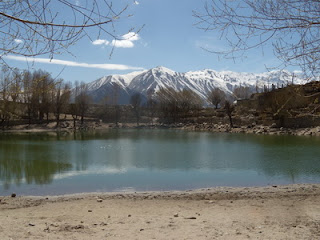Satluj.
The Satluj-This is the main river of Kinnaur approximately separating
the region into two part. It runs within the Himalayan mountains for concerning
450 kilometers and the first fraction of its route is west-north-west. When it
enters Kinnaur, it usually takes south-westerly way. Within the region the distance
end to end is concerning 130 km. Its basis is hypothetical to be at a great height
on the southern countenance of the Kailash range whence it flow into the holy
lake Rawan Hard. As far as the town of Khab it is approximately a raze violent
flow. At Khab it receives the Spiti river where the divan of watercourse is
still on top of 2,589 m far above the ground from the denote sea height. The
Satluj descend from about 3,050 m (the point of its entry in the region), to
1,220 m at Chaura graceful approximately the entire way flanked by thin cliff
and therefore, there is no open earth worth telling all along its bank.The
water of the river is more or less discoloured.Cultivated fields in terraces
are normally at substantial altitude from its banks and thus resistant from the
turbidity of water which main in June, July and August. The average discharge
is about 2,000 cusecs during the winter and 100,000 cusec during June-July. The
tributary of the Satluj in this region are the Spiti, the Ropa, the Taiti, the
Kashang, the Mulgoon, the Yula, the Wanger, the Shorang and the Rupi on the
right bank and the Tirung, the Gyanthing, the Baspa, the Duling and the Solding
organization on the left bank.
Spiti
It is the next main river of the area which has its basis
far north on the eastern slope of the mountain range which run flanked by Lahul
and Spiti. The river is shaped at the bottom of the Kunzum Range by the flowing
together of Kunzum La Togpo and the stream Kabzima and Pinglung. It flow
eastwards till Kaurik and then turns southwards to join the Satluj river at
Khab at an altitude of 2589 meters. Spiti is connected by more than a few
feeders which meet the river both at right and left banks. Chaladogpo, the
Yulang, the Lipak and the Tirasang are its main tributary. The only mentionable
branch on the left bank is Chaladogpo obtainable flanked by Chango and
Changriang, whereas on the right surface are the yulang, the Lipak and the
Tirasang.
Baspa.
The Baspa river, the another feeder of the Satluj, rise on
the north eastern declivity of the external Dhauladhar of the Himalaya. It is a
big and precious watercourse, organization easily down a well-known valley. It
is surrounded on the south-west by the Dhaola Dhar and on the north-east by the
enormous Raldang climax of the huge Himalaya. The canal of the river is broad.
At Chhitkul its breadth is approximately twenty meters, inferior downward, the breadth
is from twenty-three to twenty-five meters. After course in a north westerly way
it waterfall into the Satluj at Karchham.The Baspa is next to Spiti in dimension
and is about seventy-two km in distance end to end. Its whole route lies inside
the region. As contrast to other rivers the Baspa is quite confused and often change
its route thereby doing wide injure to the refined field on its bank.It receive
the a variety of stream and streamlets on both of its banks. On the left side
mentionable tributary are Zupkia, Thatang, Bering and Rukti and on the correct
Suthi. This is the the majority occupied vale and there are now enduring bridge
at a lot of places. An outlandship fish class recognized as brown trout (salmo
fario) is establish in this river.
Nako Lake
This gorgeous lake is far above the ground height lake situated
in the Pooh sub-separation of region Kinnaur. The lake is bounded by willow and
glacial trees. There is a little town on the bank of this lake - and the town
seems to be half hidden by the lake's limits. On the water's northern side, are
four Buddhist temples with stucco images and murals. Near Nako is a trail-like feeling
credited to the saint Padmasambhava. It freeze in winter and citizens take
pleasure in skating on this lake.






















0 comments:
Post a Comment